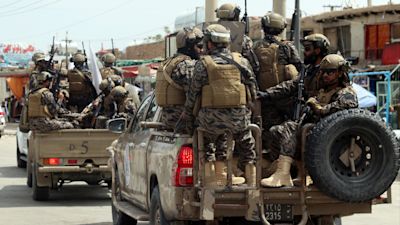Insight
ISIS-K or Al Qaeda? Concerns grow in UK and US over terrorism resurgence

Global Security Editor Rohit Kachroo reports on the scene in Afghanistan on Tuesday
If 'terror' was the enemy in America’s so-called ‘war on terror’, this was a partial victory at most.
There has been no major attack on the United States emanating from Afghanistan since 9/11 - as was feared back then - but the US has left with an unknown threat in Al Qaeda and a growing threat from Islamic State. To help contain ISIS-K, the Afghan offshoot of IS, US intelligence agencies have had to make an arm’s length friend of its enemy’s enemy, the Taliban.
Given that so much of the security assessment relies on how true the new regime is to its word, it is difficult to make firm predictions about what might happen next.
Two statements, 20 years apart, made on either side of the United States’ military operation in Afghanistan, show how some threats have altered but not ended.
Global Security Editor Rohit Kachroo on why the West is now reliant on the Taliban to deal with security in Afghanistan
In 2001, when the US military launched its first strikes on Afghanistan, then President George W Bush promised to wipe out Al Qaeda; in grave tones he said “peace and freedom will prevail”.
Then last night, after the final C17 took off from Kabul, a CENTCOM (US Central Command) commander warned over a video link (there was no presidential address last night) that there are “at least 2,000 hardcore ISIS fighters in Afghanistan now”.
The terrorist group remains “a very lethal force”, he added.
2,000 hardcore fighters would not necessarily make ISIS-K a serious terrorist threat to the US or the UK. But officials in both countries are concerned by the unknown impact of the withdrawal on the group’s recruitment attempts.
There are suspicions that ISIS-K will pick up more followers if Taliban extremists see their leadership cooperating too closely with the Americans (that’s unless they don’t cooperate, which the Washington intelligence establishment would see as a much worse outcome).
Until last week, the US was more concerned by the threat posed by Al Qaeda militants in Afghanistan than ISIS-K, and the possibility that they might set up new training grounds under a Taliban regime which turns a blind eye.
Alongside so-called ‘over the horizon’ attacks and remote surveillance, the Americans are relying on trust in the Taliban, which has promised to smother terror groups planning to use Afghanistan to launch attacks abroad.
So foreign governments might be concerned to see video over the weekend which appeared to show the group’s former security chief returning to Nangarhar province in Afghanistan following its fall to the Taliban.
Dr Amin Al-Haq became a close aide of Osama Bin during the 1980s and helped him to escape the mountains of Tora Bora.
If verified, the footage of Al-Haq’s reemergence is significant - not just because he is being given a rapturous reception as he arrives, but because he chose to return in the first place - seeing the new Afghanistan as a safe space for one of the terrorist organisation’s former leaders.